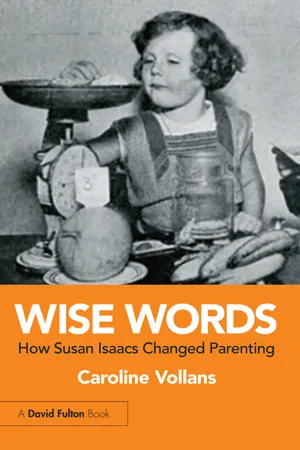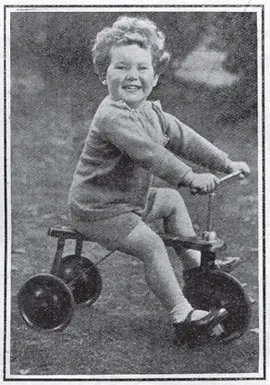20 August 1930
“L.J.R.” writes: “I should be so very glad of your advice regarding my daughter of two years and two months. She is an only child and extremely healthy, full of spirit, and, I am told, more than ordinarily intelligent for her age. Until recently she has been fairly easy to manage, although very self-willed and inclined to be disobedient. Now, however, when told to do anything, or told NOT to do anything, she immediately starts screaming as loudly as possible, and ends by crying bitterly. We try not to demand anything unreasonable, but she seems to delight in seeing how far she can go without being punished. I realise it is quite useless to keep on scolding and punishing, but, on the other hand, if you give in to her on a single point she immediately takes it as a sign of victory, and it is no use trying to retrieve it afterwards. She has entirely been brought up on Truby King lines, sleeps fourteen hours out of the twenty-four, never has a light in her room, or is nervous of anything. Lately, too, she keeps picking at her nails (not biting them).
I also notice that she is much more disobedient when her Granny is with us than when she is alone with either her Granny or myself, although her Granny is, if anything, more strict with her than I am, and she is thoroughly used to her, as she stays with her Granny one day and night a week. Baby is very loving and affectionate and is always extremely sorry after one of these fits, and always promises not to scream again, but immediately forgets again. She has plenty of toys, although she does not take much notice of them, and prefers to play with odds and ends and run messages about the house. I should so much like your guidance in the manner of treatment, as I do not want to break her spirit, but on the other hand, I cannot have constant screaming at the slightest correction.”
Your little girl gives us another example of what has been brought out in a large number of the letters I have had recently – that is, of the way in which a child who may have been very easy and placid and docile as a baby will often become difficult and defiant in her third year. A period of rebelliousness and temper seems to be quite a normal occurrence round about two to four years of age. In part, it must be taken as a sign of healthy development towards independence and self-reliance, and when, as seems to be the case with your little girl, there is practically no sign of nervousness or neurosis, the problem is fairly straight forward.
That is to say, there is nothing to be distressed about, although the child’s behaviour may for a time cause practical difficulties and be trying to your patience. It is simply a matter of maintaining steady firmness and gentle affection towards her, and resting assured in your own mind that, given these conditions, the child will pass through this phase of difficulty, and after a year or two will settle down into a more cheerful acceptance of denials and demands.
There is no reason to think that keeping firmly to your requests and controls, provided these are reasonable, will “break her spirit”. If one set out to demand mere obedience for its own sake, irrespective of whether the things one asked the child to do were really sensible and appropriate, then one might set up a feeling of helpless frustration which would either confirm the child in miserable defiance or deaden her mental life altogether. But if the things you ask her to do and not to do are always simple and clear, and really needed by the situation, and she has always the sense of your affection and understanding, she will learn to accept your demands. During the screaming fits one can only be patient, but one must not allow the child to get her own way because she screams. There is really no way by which one can stop the screaming itself, except by letting the child learn from experience that it is useless.
What you say about her being more difficult when you and her Granny are both present is again an instance of what I pointed out a few weeks ago – namely, the child’s attempt to “divide and rule”, which so often happens when more than one adult is in charge. This, again, is quite an ordinary characteristic of childhood, and will be left behind presently if your little girl finds that she does not gain anything by it, and is not able to win one of the grown-ups over to spoil her, against the other.
“N.C.” writes: “I want to tell you how very interesting I find your articles. I have been particularly struck by this week’s problem, ‘Displaced’. My little boy is one year and ten months, and his sister is nine months old. He was very unhappy at her arrival, and used to try and pull her off my lap. Now he is on the whole very good to her – tries to protect her from ‘bumps’, shares things with her, etc. But if he is tired or hurts himself, at once he wants my exclusive attention. As I am often quite alone (I only have occasional help) this is sometimes difficult, and now he has a funny new trick. If anything goes wrong, or the slightest word of censure, he flops down and crawls. He has walked since he was ten months old, and is particularly active and sure-footed – can climb and run like a three-year-old. And, except for talking (he can only say a few words and will rarely use them) is otherwise advanced – very independent, quite clean at night and day, feeds himself very tidily and so on. This is, I suppose, because when the baby crawls we admire and praise her, and so he wants admiration too; but it is particularly trying if there are visitors. He shows off so badly with anyone who does not pay him attention. I have two or three severe friends who are full of theories as to bringing up children (they have none of their own!), and show plainly they consider him a spoilt, cross boy. So, he keeps up a steady whimper for their benefit, and last time threw a plate at one poor lady.
If I could put the baby down and hold him on my knee it would be all right, but she is frightened of strangers, too, and howls at them (though a most good-tempered, beaming person at other times). What, I wonder, should one do for the crawling, and the tiresomeness with strangers? Ignore it, try to prepare beforehand, – ‘Be a good boy when the ladies come won’t you?’ – or is that only making matters worse? I am sure really these things will pass, but one is so anxious that no ‘complexes’ should be left behind, and I do think any sort of jealousy or feeling of neglect can linger very bitterly. I think a little child wants a great deal of love and petting (it is a most important ‘vitamin’, rather apt to be neglected these ‘leave them alone in the pram’ days), and yet one equally hates to see an exigent, over-clinging child.”
There is no doubt that when your little boy crawls he is trying to win the attention and praise which his baby sister gets for doing the same thing. I do not think you can do anything about it directly, but a great deal can be done indirectly by letting the child win praise and admiration for the gifts appropriate to his age. The trouble springs from his jealousy of the baby and his fear that her coming means the loss of your love. To his mind, your nursing of the baby means that you love her more than you love him, and his becoming a baby again is partly an attempt to win your approval and affection. You will have to find ways of making him feel quite sure that, although you take the baby on your knee, you love him as much as ever and that you admire him because he can walk and talk and climb and make things. His need for admiration from visitors will be greater just now, while he is in this state of jealous fear. It would be quite useless to scold him for it, and the demand, “Be a good boy when the ladies come”, cannot mean anything real to him. If, however, you can build up in him a sense of his being “a big boy”, and let him have your full admiration for the things he can do and the baby cannot, this will greatly support him and make him a little less dependent on rivalling the baby as a baby.
But I confess that when I read your letter describing the situation with the visitors, I felt that it was the visitors I wanted to keep in order rather than the child. Your little boy obviously has very many splendid qualities, independence, cleanliness and skill, and tenderness to the baby. It seems clear that he is really developing very well. If he were mine I should do my best to avoid exposing him to a situation in which he senses the disapproval of a group of unsympathetic adults. Children are extremely quick to sense such disapproval, and it always makes them more difficult. If you cannot avoid your severe friends being present with your children, I should try to educate them a little in child psychology beforehand. If they understand something of what the boy’s behaviour means, they might be able to help instead of hindering.


